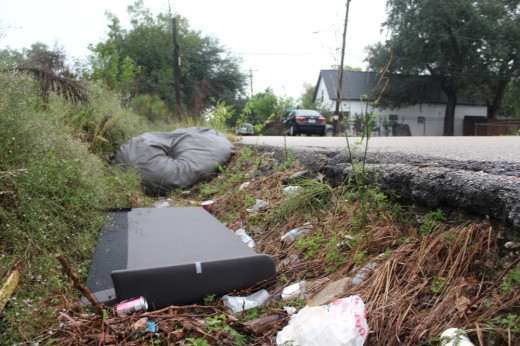Although city officials have been working to combat illegal dumpsites with funding boosts and hiring efforts over the past few years, a new plan seeks to invest $18 million in a more comprehensive effort.
The plan, introduced by Houston Mayor Sylvester Turner at a March 29 press conference, is called One Clean Houston—a play on Turner's public safety plan One Safe Houston, which he introduced in February 2022.
Like One Safe Houston, the new plan will employ a "very holistic, comprehensive approach" that will include cleaning up sites faster, bolstering enforcement efforts, improving the city's depository sites and better educating the community on how to dispose of heavy trash, Turner said at the March 29 event.
"It’s not that we haven’t been doing things, but it just needs to be very integrated and very robust, working with many of our stakeholders," he said.
Illegal dumping is a term used to describe the act of leaving trash anywhere it is not legal to do so, often on vacant lots or city-owned right of way along streets. Residents are instead required to take such trash items—typically old furniture, tires or construction material—to one of the city's six drop-off sites, where they can be disposed in a landfill or recycled.
The One Clean Houston plan, developed by a working group of city department heads and stakeholders, features three key areas of intervention: rapid cleanup, better enforcement, and prevention and education. Its execution will involve working with community members, courts, nonprofits and industry leaders, Turner said.
About $11.5 million will be allocated for supplemental heavy trash services, including contracts for illegal dumping and litter collection over the next three years. Another $3 million will be used to expand the Solid Waste Department fleet by adding 11 new single-operator grappler trucks for bulk waste collection.
To address a staffing shortage in the Solid Waste Department, Turner said the city is increasing hiring bonuses for new truck drivers from $3,000 to $5,000, a move he said will put the city on par with the Metropolitan Transit Authority of Harris County.
On the enforcement side, another $419,000 has already been used on the installation of 25 security cameras to catch illegal dumpers, which Turner said are now in operation. The plan also allocates $100,000 to pay for overtime for officers in the Houston Police Department to increase investigations as well as $1.9 million to expand a partnership with the Harris County Precinct 1 Environmental Crimes Unit. That $1.9 million will be used specifically to hire six new investigators and purchase 120 new cameras, Turner said.
The budget for the Solid Waste Department will also increase by $620,000 to pay for six new code enforcement officers whose jobs will involve enforcing the city’s ordinances and ensuring property owners are complying with heavy trash rules.
"We have to have an effective enforcement mechanism so people know it's not 'one and you do it again and again and again,' but 'one and there are consequences for your behavior,'" Turner said.
Residents who place heavy trash on their curbs outside of heavy trash day will also be ticketed, Turner said. City regulations require tree waste and junk waste to be placed on curbs between the hours of 6 p.m. on the previous Friday before a property's designated collection day and 7 a.m. the day of scheduled trash collection.
"People set up heavy trash early, and it will sit there for days," Turner said. "What ends up happening is, people end up adding to that. People need to be re-educated on what the schedule is, and we intend to hold people accountable for that."
The city is also adding roll-off containers to reduce wait times at its six drop-off sites for heavy trash. Officials are also piloting a new neighborhood drop off program that will allow residents to drop off trash for free April 29 at the city's Blue Ridge and McCarty landfills, Turner said.
The $18 million in funding for One Clean Houston will mainly come from funding the city received through the American Rescue Plan Act, Turner said, and will cover a two- to three-year period.
Residents in communities that have been plagued by illegal dumping said it has negative effects on neighborhood aesthetics, waterways and property values, among other issues.
The city has been under investigation for its illegal dumping practices by the U.S. Department of Justice since July, an investigation spurred by alleged discrepancies in how quickly the city responds to dumping complaints in white neighborhoods compared to neighborhoods that are largely home to people of color. The city of Houston has strongly denied the allegations.
At the March 29 event, Turner described illegal dumping as a citywide problem that goes back for years, but Mark Wilfalk, director of the city's Solid Waste Management Department, said improvements can already be seen as a result of recent efforts. Although the city at one point was taking 45 days on average to clean up illegal dumpsites once they were called in, that average is now down to 20 days, Wilfalk said at the March 29 conference.
"We still want to go further than that," he said.
One of the challenges, Turner said, involves changing the way people think about littering. In addition to the changes being rolled out by the city, Turner also made an appeal to residents to change their habits.
"This is an unprecedented investment in this issue that impacts Houston’s neighborhoods, particularly the most vulnerable," Turner said. "I'm asking all Houstonians to take some pride."
Residents can anonymously report illegal dumping tips to Crime Stoppers of Houston by calling 713-222-8477. Residents can also report tips directly to the Houston Police Department at 713-525-2728.





